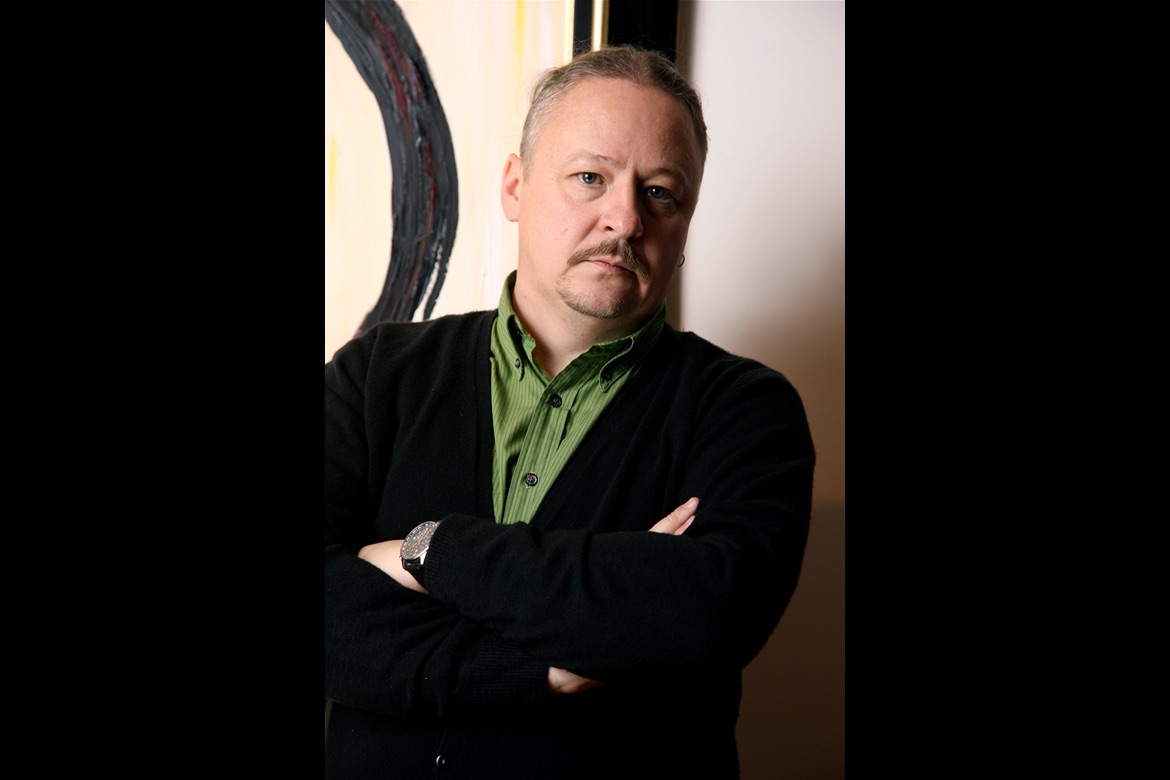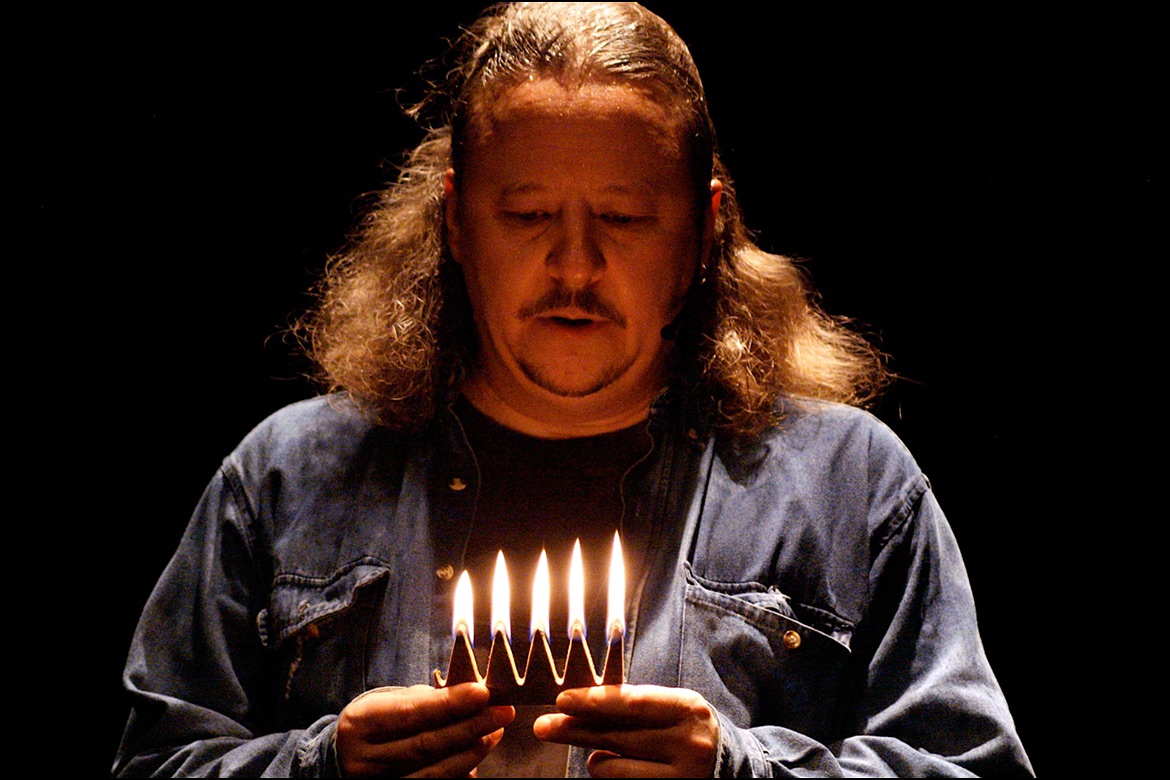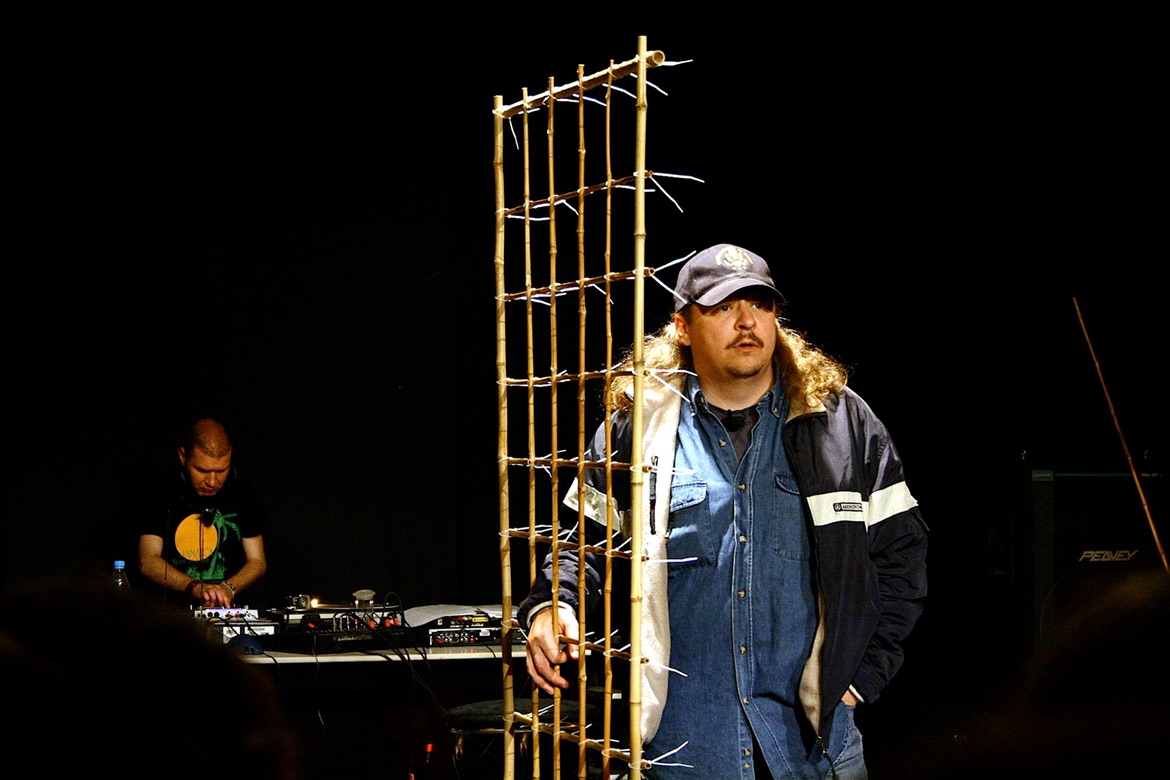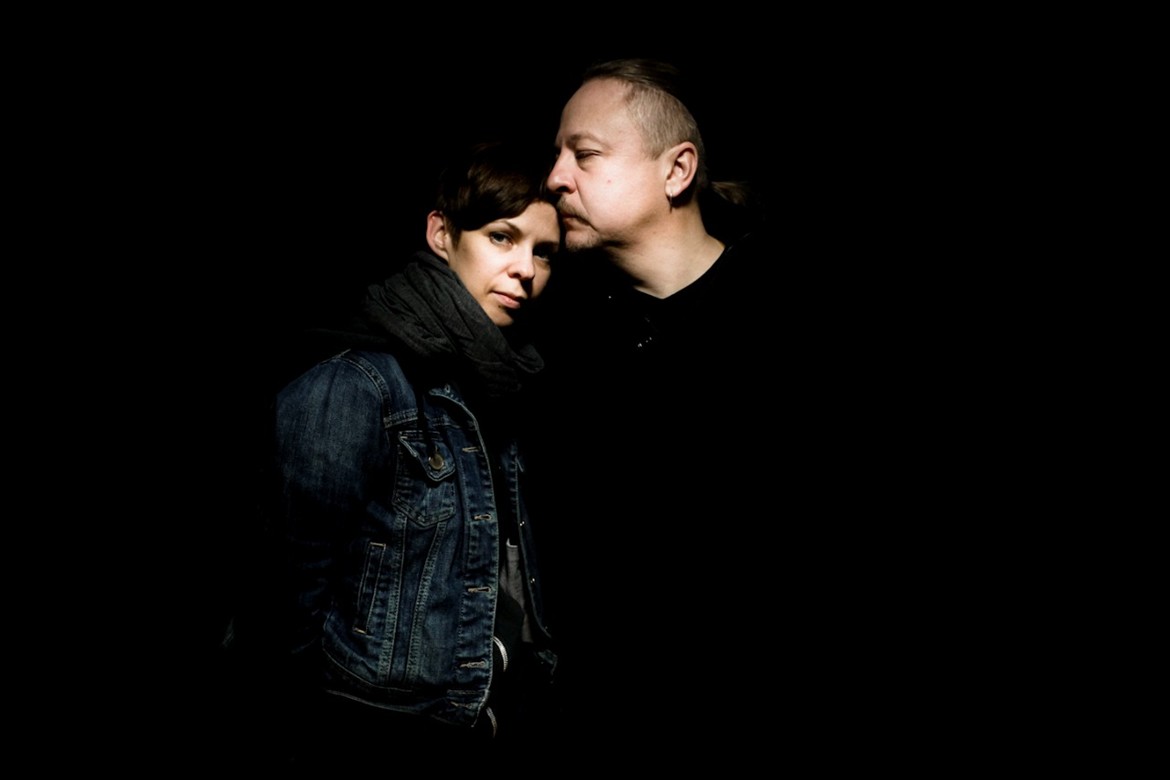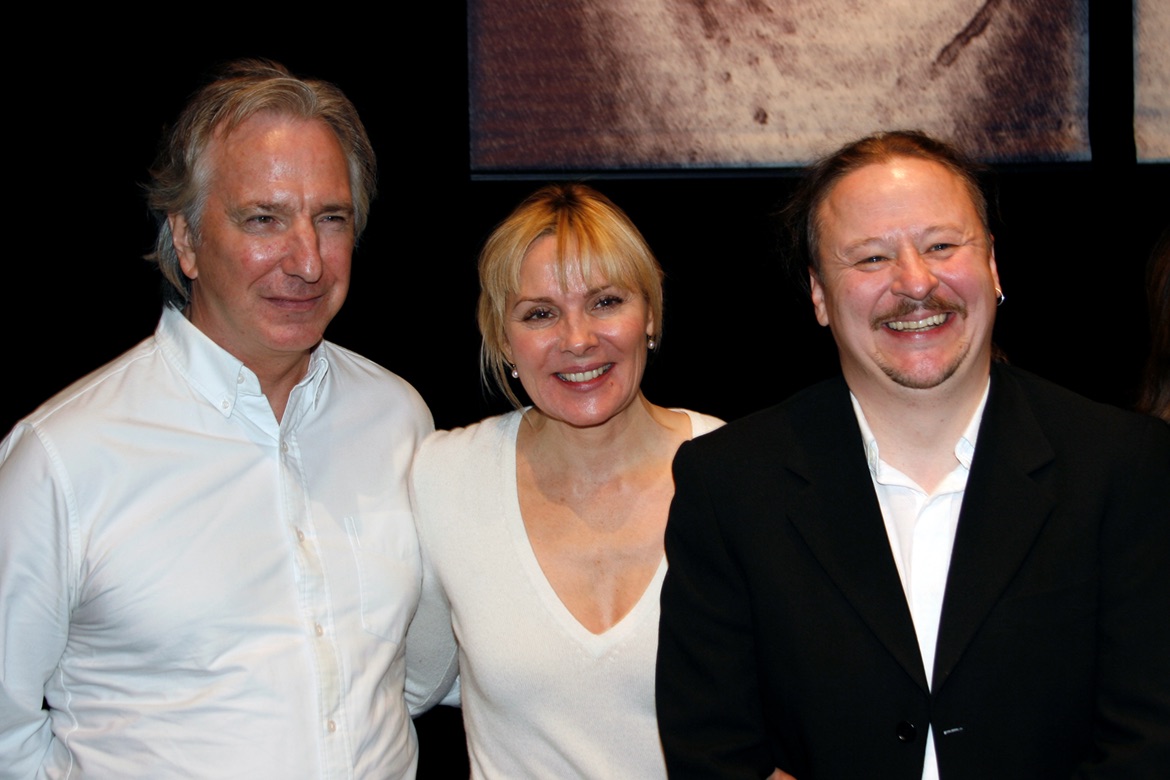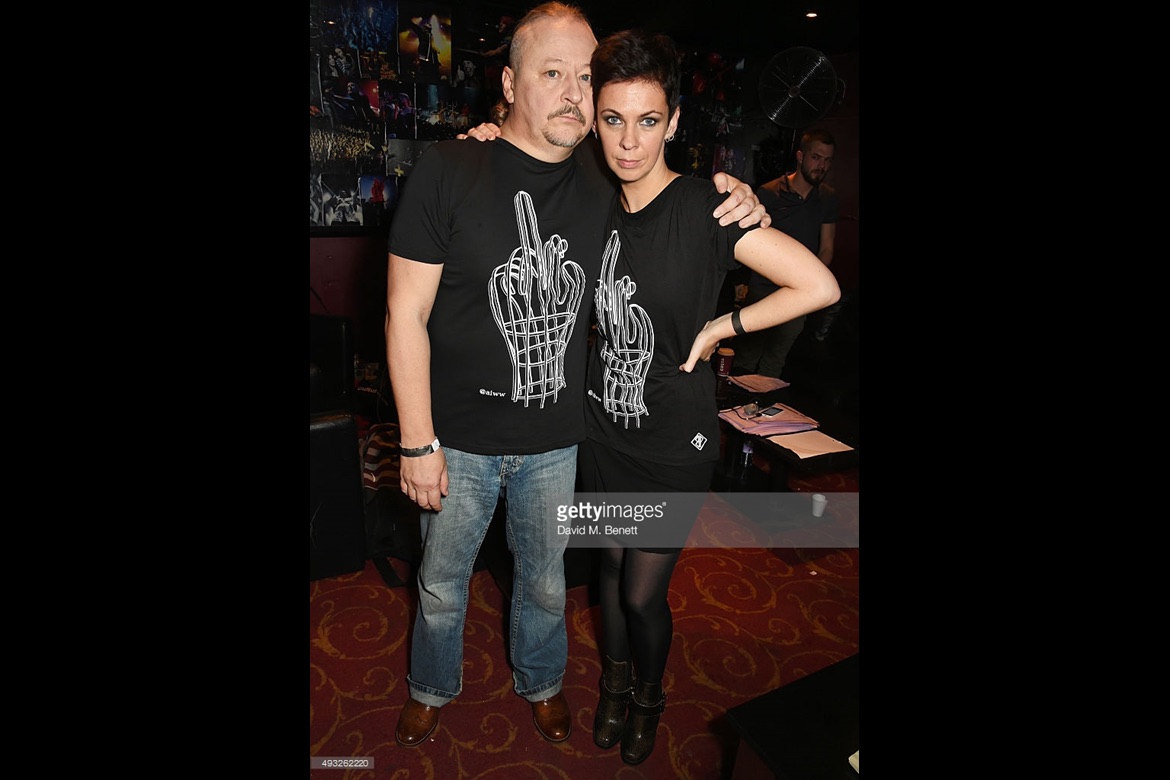An interview with director of Belarus Free Theatre Nicolai Khalezin.
Belarus Free Theatre had a successful tour at Shakespeare 400 Chicago festival in early February. In an exclusive interview with our correspondent, the theatre's artistic director Nicolai Khalezin explained how he got to London, talked about theatre in Europe and plans for future and said why he wasn't ready to become a subject of Belarusian politics.
Who is who. Nicolai Khalezin. A Minsk-born artist, journalist, playwright, director, actor. A co-founder and stage designer of Minsk Alternative Theatre. A co-founder of Vita Nova gallery (later renamed as the Modern Art Centre). The founder of Imia newspaper (1995-1998), the author of the Taj Mahal project in that newspaper. He worked for Naviny and Nasha Svaboda, the newspapers in Belarusian that were closed down by the authorities. He worked in political consulting and helped launch the website Charter'97 (www.charter97.org). In 2002, he wrote his first play (A Midnight Victim). He is the author of more than 20 plays, the most famous of which are Here I Am, Generation Jeans, Discover Love (the latter two were written in collaboration with Natalia Kaliada). The play Here I Am was shortlisted for the Theatertreffen Stückemarkt festival in Berlin and won several theatre awards in Russia. He is a co-founder and artistic director of Belarus Free Theatre since 2005. He has been playing in Generation Jeans and Being Harold Pinter as an actor since 2006. He staged the plays Generation Jeans, Discover Love, Red Forest, Trash Cuisine. He won the French Republic Prize, the Europe Theatre Prize, the Freedom to Create Prize (UK). He is an active teacher, collaborating with DasArts theatre school (the Netherlands), the California Institute of the Arts (the US) and European Humanities University (Lithuania).In 1999-2008, he was arrested four times in Belarus on political motives. He was sentenced to a short term in custody in 2002 and was lucky to avoid arrest in December 2010. He fled Belarus at the beginning of 2011. He lives in London.
– Nicolai, do you have a feeling that you live in the theatrical Mecca?
– I have a sober view of the theatrical situation in the world. I don't want to boast, but I know it well. We played on five continents and studied each theatre system. The advantage of the British system is its incredible level of dramaturgy. The UK is number one in the world in what concerns dramaturgy. The average level of writing skills in the country is very high. You see the understanding of what a dramatic conflict is, how a scene should be written… But there's the other side. The horrific situation of directing. British directing is mostly endless conversations on the stage. British directors have taught audiences that everything must be explained, and now audiences don't understand anything if they have to think themselves. If a show has a metaphoric scene, a critic writes he or she doesn't understand it. A playwright is a dictator in Britain. He or she has the right to do everything, even approve cast or appoint a director. Today a director is the fourth person in the theatrical process in Britain. A playwright comes first, followed by a producer and then by an actor. Producers and actors can sometimes swap places. If a project involves such an actor as Kevin Spacey, or Judy Dench, or Michael Caine, or even Ben Whishaw (from younger actors), it's not excluded that he or she will appoint a director. We are friends with playwright Mark Ravenhill. He constantly attends workshops, he learns. He has focused his activity on Germany… Peter Brook lives in France and visits London only to play shows… But in London you can notice if someone gains success as a director. His or her ideas are stolen immediately and so on. Therefore you can't repeat yourself, you have to develop. You need to build a form from the selected material, meticulously and scrupulously. I like British theatre for its structure and the way it is organised, but German theatre is better if we speak about creativity. It has another thing – a director's dictate to the detriment of dramaturgy.
– It would be ideal to combine English dramaturgy and German directing…
– Peter Brook' theatre is the ideal structure. He moved to France, but he hasn't become a French director. He himself has become the System that subdues everything: actors, financing, creative process… Brook has always acted against all odds, but even he failed to defeat the system in England.
– Can you create a similar System with BFT?
– We are moving towards it, but it takes a long time. We've created a very serious conflict inside the theatre space with a number of our projects. For example, Red Forest show provoked a conflict, and critics were divided. Young critics admired it and gave four and five stars, while old critics said: “We don't understand.” There's a scene where refugees are walking on the water. And they put books in the water before making a step. A critic writes something like “A remark in my notebook reads: 'They are using blocks (but of books. Why?) Japan? Confused.'” Firstly, it was written it was flooding in Japan. Secondly, yes, they are using books. Thirdly, fifthly and so on...
It's a metaphor. Theatre operates such a notion as a metaphor. Young critics say: “We finally see the product with just a few words, and we understand the sense through emotions and metaphors.” Polls show that 85% of viewers say they will attend BFT's shows even if they are disputable and controversial. Our main audience is aged from 18 to 25. There are seminars in England on how to attract younger audiences to theatres. We don't need seminars, our audience is young. Old critics don't understand well how to treat it. They see reviews by younger critics. They begin to protest against their colleagues rather than against us. How dare they praise what I don't accept? It was a rather big conflict about our work Price of Money. All our latest projects provoked a sort of tension, and I like it. Endless praises must end one day. Otherwise a public discussion seems impossible. In Germany, the shows that stir up a conflict are valued higher than the works that everyone praises. This is what is called theatre's influence on society.
– Who is on the cutting edge of the theatre process in Europe today?
– Jan Fabre. You can be critical about his latest work Mount Olympus and find a lot of defects (by the way, I found only a few), but he shifted the focus and created the Mahabharata of our times. This work will have the biggest impact on the world's theatre space. Such show would be impossible in Britain. At least for financial reasons… No one could have got funding for such a project. But even if such a miracle had happened, critics would have written they don't understand it…
Five years ago: Minsk—New York—Chicago—London
Nicolai Khalezin has been living in London since 2011. Five years. Before talking about results of his first five years in Britain, I asked him to recall the events before his departure.
It began in Minsk on 19 December 2010. People gathered in October square after the farce called “presidential elections” to protest against electoral fraud. Head of Belarus Free Theatre Nicolai Khalezin and his wife Natalia Kaliada were among protesters. Natalia got arrested a few hours after the rally began. BFT's tour manager Artiom Zhelezniak was arrested shortly afterwards. Meantime, Belarus Free Theatre was expected to play at Under the Radar theatre festival in New York in early January.
– Natasha and I participated in protests on 19 December 2010. Natasha got arrested, but I didn't. A column of riot policemen divided us. One part of protesters was thrown into police vans, the other one scattered. I took my daughter at night, came home and realised that everything failed: Natasha is in jail, so, we can't fly to New York. But she was released the next day and came home. Secret services were spying on me. My dog and my younger daughter, who didn't open the door, saved me. They came for me at 9 in the morning and heard the dog barking. They decided not to break the door… Natasha was taken for another woman by mistake. A judge asked: “Olga Leonidovna, why did you arrive in Minsk from Zhodzina on that particular day?” Natasha was surprised: “Firstly, I am not Olga Leonidovna, secondly, I am not from Zhodzina, thirdly, I didn't arrive anywhere.” – “Are you Kaliada?” – “Yes, I am Kaliada.” – “Olga Leonidovna?” – “No, Natalia Adreyevna”. It was a scandal. The judge called the policemen and shouted at them: “Do you want me to try her under fake documents? This is not her. It is another person.” Natasha was held in one cell with that woman – Olga Leonidovna. Their documents were mixed up and sent to different police stations and courts. The judge said: “Taking into account that you have a daughter under 12, you get a fine.” Natasha was issued a fine, and then she went home. Two or three persons were released in a similar way those days… The police woke up the next day and began to catch her. I was taken out of the town to my friend's house, but Natasha didn't even know she was hunted. She visited Ira Khalip's parents, Bandarenka's wife. And secret services were following her everywhere. Ira's mother said: “It's Natasha whom they are hunting!” We understood it was the end. She began to hide, too. We went to Moscow to take part in Pasha Selin's talk show on NTV and Larina's show on Echo of Moscow radio and returned to Minsk like idiots. We used tickets issued for other persons. But we hid outside Minsk. It was a huge risk! We left the country on New Year's night, 20 minutes past 12. I was lying on the floor of the car with a blanket on me, and a child was sitting on the blanket...
– It's a script for a thriller!
– Absolutely. And you can't understand if it's happening to your in reality and what you should do if you are stopped. The car was with Russian registration plates. The main thing was to get to Russia. They won't chase us there. We crossed the border, and our driver said: “Do you really think I would have stopped?” He is a retired army officer. He knows how to behave in such situations… Artiom Zhelezniak was sentenced to 11 days in custody. He was released only at noon of December 31. The US embassy opened specially for him, he received a visa in three minutes and was able to leave the country. In the first days of January 2011, BFT's actors managed to leave for Moscow in small groups with fake documents. The decision not to fly to the US from Minsk was right. KGB officers were waiting for our actors in Minsk-2 airport on January 3. The next day, KGB officers came to Natalia Kaliada's parents. They were looking for Kolia and Nanasha…
– How did it happen that Belarus Free Theatre got to Chicago after New York? You didn't have Chicago on your initial route.
– Oskar Eustis (the artistic director of New York's Public Theatre) said later he had never found money so easily. He came to the Ford Foundation, told them our story and left it with the required sum, and that sum was large. Usually, a contract supposes that if, for example, you have a performance in Young Vic, you have no right to play it within a radius of 100 kilometres, roughly speaking. It was a unique situation in Chicago, because three competitors united – Chicago Shakespeare Theatre, Goodman Theatre and Northwestern University. Two theatres and a university made a tour for us for a month. It speaks much about the city and people. The behaviour of Bob Falls (Robert Falls is Goodman Theatre's artistic director), Criss (Criss Henderson is Chicago Shakespeare Theatre's director), Barbara (Barbara Gaines is Chicago Shakespeare Theatre's artistic director) lies beyond theatre. As our slogan reads, “More than theatre.” It means a lot!
– Bob Falls was right when he said, opening the tour in 2011: “This is the beginning of a love story.”
– Everything relies on relations between people, everything is personal. We perform in New York's La MaMa almost every year. The founder of the theatre, now late Ellen Stewart, was so touchingly kind to us. We are friends with current director Mia Yoo, too… Our relations with Chicago and New York are unique. One cannot compare them to any another city.
– However, you chose London among New York, Chicago and London…
– We didn't have other options. We performed in New York and Chicago, flew to Hong Kong and then to Britain (and remained there without shows with Natasha) and then returned to play in New York again. One of the biggest law firms contacted us in Chicago. They knew our situation, and they said: “We want to help you stay.” We talked and discussed possible developments. It was a very successful period for us, but we didn't think about staying. We thought everything would soon end in Minsk (as usual) and we would be able to return home. As a result, all except us, Aleh Sidorchyk and Vladimir Shcherban flew back to Minsk. We flew to Britain to give evidence in proceedings over the situation in Belarus and take part in parliamentary hearings. News from Minsk was sad. Trials were held one by one, and people were getting prison terms… Our friends warned us that investigators asked about us during interrogations. I had three charges, Natasha had two ones. If we had returned, we would have been thrown into jail immediately, there was no other option. We are in London, our visa is expiring, we are in limbo. We have nowhere to go. We are in vacuum. We took a decision to stay in Britain after a meeting with the foreign minister. We had one child with us, but the other one was in Belarus. We didn't speak about it loudly, fearing she could face pressure. We made documents later and finally reunited… It would have been idiotic to come to Minsk and go to jail. We understood that in the West we would do more for ourselves and our country. BFT's staff continued working in Minsk, and we began to learn a new technology of staging a play via Skype and began to settle in London.
– You and Natasha did a lot to release political prisoners Andrei Sannikov, Natalia Radzina, Iryna Khalip. You said in 2013 it's not the time yet to tell the truth about all those events. Has this time come?
– It's not the time today, because the people, who helped organise the escape of, for example, Natasha Radzina, are still in Belarus… I can't say we got them out of prison. We were carrying out an international campaign that involved a great many of people: famous persons, politicians, public figures, government officials, people from European institutions. Every day in prison was an ordeal for political prisoners, the were between life and death. They went through it and won.
London: 2011-2016. First results of the first five years
– You started a new life in London in spring 2011. The nightmare was over?
– No, the nightmare only began. We didn't have anything. The three of us had one bag each. The rest belongings were in different countries. A big bag with winter clothes was in Chicago. We received it only three months later. Bags from Minsk, London suburbs, Chicago arrived… It was very hard. The city is expensive… In the beginning, people just handed us over to one another. Ira Bogdanova, Andrei Sannikov's sister, gave us a home. We lived at her place while we were making our documents. Our friend, a journalist, went to Moscow to work there for a year, gave us the key and offered to live at her place. Then we moved to Sigrid Rausing. The Rausing family owns Tetra Pak company. Sigrid and we had known each other since 2008, but had never met before. She supported our tour, and we gave her a special diploma. We gave diplomas to all people who helped us. Sigfrid was touched and offered us to move to Chelsea, where her parents lived. We lived in an incredibly beautiful mansion with Magritte paintings on walls. Then we moved to Richard Attenborough's home. We are good friends with the Attenborough family. We had many touching moments with Richard long before his death. We had lived in his house until it was sold. The last residents… In that house I wrote the script for Connection film in 40 minutes. The first draft was approved without changes… Then fashion designer Vivienne Westwood's son Joe Corré gave us a home, He bought a house for his daughter, gave us the key, saying: “She's too small to live on her own. You can live there so far.” We have been living here. For the third year… Everyone was telling us: “The main thing for you is to organise your everyday life. You can't work properly until you begin to have dinner at home.” It has a great value for us. We regained the feeling of home and family dinners thanks to our friends.
– What about the theatre?
– We registered the theatre in London, but we had no funds. It's an illusion that everyone receives money once they come to London. London theatres stay in a queue, and you go to the back of it. As most English theatres do, we became a charity. Our board of trustees includes Michael Attenborough, David Lan (Young Vic's artistic director), actors Jude Law and Sam West, playwright Laura Wade. It doesn't necessarily mean they helped us financially. They helped Belarus Free Theatre gain confidence not as a touring theatre, but as a UK-based one. This help is priceless! We began to receive spaces to perform. We played Challenge. Euripika in London's Almeida, we perform in Young Vic every year – this is one of three most prestigious theatre venue in Britain. We had more than 100 reviews of our shows during the Staging a Revolution festival on the 10th anniversary of Belarus Free Theatre. The festival was included in top 15 greatest cultural events in London of 2015 in two categories – Music (concert) and Theatre. We missed the theatre festival in Italian Modena due to our festival. We came to Modena for a press conference just for one day and apologized for not being able to perform. The president told us: “Your status allows it. Now, when you have time, we'll find an opportunity for you to play. You are always welcomed here, either at the festival or on any occasion.” We enjoy absolute trust! Only a few directors and few theatres in the world can boast it.
– Who do you feel you are today: a Belarusian living in London or a cosmopolitan?
– I've stopped reflexing on the matter. I don't consider myself a Belarusian living in Britain. I don't consider myself a Briton. I don't consider myself a cosmopolitan. I don't want to think about it.
– This problem doesn't exist for you, does it?
– The problem exists, but I'm not going to solve it. I've recently made a list of my projects. Two serious theatre disciplines that must be created academically, as educational systems; two documentary books, several plays, staging particular shows… I read it and I understand I need to do consistently what I've planned. I have no time for reflexing!
– Tell me about your plans regarding the theatre, please.
– We've recently visited the refugee camp in Calais, France. Good Chance Theatre was opened there by two English friends who are preparing for a theatre festival focusing on refugees. They offered us to make a show. I have three months to write a play about a man who flees his country. I only have a title so far. I understand that if I am engaged in the theatre that responds to current topics, it's not that I need to do it, I must do it. There's a space, time and people ready to back the project. It's carte blanche.
– And you have personal experience…
– Yes, the personal experience of making shows and the personal experience, on which the material is based… In July and August, I am going to stage a play about the artists in the zone of Russia, Ukraine and Belarus. This topic hasn't been covered in details yet. I'd like to attract attention to it. The artists are Oleg Sentsov, Petr Pavlensky, Maria Alyokhina. One was given 20 years in prison, the second on is being tried, the third one already served her prison term. Masha (Maria) will play in our show. Petr Pavlensky sends materials from jail. I need to contact with Sentsov's family… The decision to stage the play has been taken. The world premiere will take place at the festival in Leicester… I will work with our actors, while Volodia (BFT's director Vladimir Shcherban) is busy with a project involving British actors: a performance based on Norwegian writer Arnhild Lauveng's book. She was diagnosed with schizophrenia and she overcame her incurable disease. It's a unique case! I am looking forward to his show. Both topic and material are interesting for me. We already had mixed performances involving Belarusian and British actors: Price of Money, Trash Cuisine, Red Forest. I already made my first show in English, Volodia will make his first show with British actors.
– In May 2011? you wrote an open letter to Lukashenka titled “Last letter to Sasha”. Almost five years passed, but the story hasn't ended…
– “Last letter to Sasha” is not only a reference to the second last letter to Sasha written by Andrei Sannikov. It really was my last letter. I will not write letters to anybody, I don't want to play any games. I know there will be the end. It's obvious. Stories without the end do not exist. There are no eternal persons in politics. Now, when the situation has come to the critical point, it stopped being interesting to me. Russia has no money, Lukashenka has no money… Yes, new groups will struggle for power, but I already outgrew it.
– What can happen to make you and your family return to Minsk?
– I don't understand why returning to Minsk is regarded as a kind of a fetish. It doesn't matter where I live geographically! We had spent most of our time outside Belarus before our departure. Let's think I'm on tour. I deal with Belarusian issues, speak at conferences, meet with politicians, but I am not ready to become a subject of Belarusian politics. I have a to-do list, and nobody will do my work for me. There are plenty of people eager to go into politics. The queue will have no end when new authorities come.
– Do you think Belarus Free Theatre influences the theatre development in Belarus?
– It does, at least because Belarusian playwrights are known in the world mostly due to Belarus Free Theatre. I am speaking not only about Russia, I mean all continents. Belarus Free Theatre is the most successful Belarusian theatre project in the world. Of course, we would have more influence if we worked in Belarus legally, if we could open our theatre centre. We could not only show our performances, but also attract theatre collectives from all over the world. It happens so that BFT more influences the situation in the world that the situation in Belarus. Professors and superfamous people are teachers in our Fortinbras laboratory. I haven't believed until recently they can visit Belarus (Belarus Free Theatre opened Fortinbras theatre school in 2008 as an alternative to official Belarusian theatre educational institutions. Fortinbras is a real theatre school with lessons and workshops by best specialists in their fields from New York, London, Zurich, Stuttgart, Munich. They come to Minsk and work with students for free. – author's note).
– What has changed for five years of your life in London?
– I've changed the coordinate system. The year 2011 was very difficult, terribly tense. My father died, and Natasha restrained me from going to Minsk several times, and I restrained her. Sometimes I was desperate, but I had to work… I saw what I had done during the year and understood I had done five times as much as I would have done in Belarus. Not two times, five times! Festivals, shows, read-throughts, performances, plays… Why shouldn't I value it? I have a chance to do and show my work to the whole world, not only to a narrow group. I have a chance to be judged by audiences, to ask if I am competent… I stopped understanding and accepting the absurdity of the post-Soviet space, and I am happy about it. This is what is called recovery. I am not ready to return in this context. I can't remain in the local point any more. I want to be in the square, see what's happening around me and convert it into art.
Photo 1. Nicolai Khalezin. From the personal archive
Photo 2-3. Nicolai Khalezin in Generation Jeans. From the personal archive
Photo 4. Nicolai Khalezin and Natalia Kaliada. Photo by Chad Batka (The New York Times)
Photo 5. Alan Rickman, Kim Cattrall, Nicolai Khalezin. From the personal archive
Photo 6. Nicolai Khalezin and Natalia Kaliada. From the personal archive

